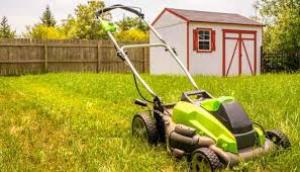Spring lawn equipment: Keep safety in mind with these tips
Spring is on its way and homeowners are eager to get outside and spruce up their yards. The Outdoor Power Equipment Institute, an international trade association representing outdoor power equipment, small engine, utility vehicle, golf car and personal transport vehicle manufacturers and suppliers, reminds homeowners to keep safety in mind when working in their outdoor living spaces
“Before you use a mower, trimmer, blower, power washer, chainsaw, pruner, portable generator or other piece of outdoor power equipment this season, it’s important to refresh yourself on handling and safety procedures,” said Kris Kiser, president and CEO of OPEI. “We’re all eager to get outside and enjoy the living landscape after a long winter, but you should take the time to do basic maintenance to ensure your equipment operates safely for the season and is ready to get the job done.”
Here are tips to help:
1. Read your owner’s manual. Follow all guidelines for your outdoor power equipment and familiarize yourself with the controls. If you have lost your manual, look it up online (and save a copy on your computer for easy reference in the future).
2. Inspect equipment. Check the air filter, oil level and the gasoline tank. Also check loose belts and missing or damaged parts. Replace any parts needed or take your equipment to a qualified service representative for servicing.
3. If you have gasoline-powered equipment and didn’t empty the tank before winter storage, drain the fuel now. You should never leave fuel sitting in the gas tank of your equipment for more than 30 days. Untreated gasoline (without a fuel stabilizer) left in the system will deteriorate, which may cause starting or running problems, or damage the fuel system.
4. Protect your power by only using E10 or lower fuel in gasoline-powered outdoor power equipment. With today’s higher ethanol content fuels, most manufacturers are recommending a fuel stabilizer be used, especially if you don’t use up all the gas purchased right away. Some gas stations may offer 15 percent ethanol (E15) gas or higher ethanol fuel blends, but any fuel containing more than 10 percent ethanol can damage – and is illegal to use in – small engine equipment not designed for it.
5. Store fuel safely. Label your fuel can with the date of purchase and ethanol content of the fuel. Never put old gas in your outdoor power equipment. If you don’t know the date of purchase, dispose safely of the fuel in the can and buy fresh fuel. Always store fuel out of the reach of children or pets and in approved containers.
6. For battery-powered equipment, recharge only with the charger specified by the manufacturer. A charger that is suitable for one type of battery pack may create a fire risk when used with another battery pack. Follow all charging instructions and do not charge the battery pack or tool outside the temperature range specified in the instructions.
7. Store batteries safely. When the battery pack is not in use, keep it away from other metal objects, like paper clips, coins, keys, nails, screws or other small metal objects, that can make a connection from one terminal to another. Shorting the battery terminals together may cause burns or a fire.
8. Clean your equipment and store it in a dry place. Remove any dirt, oil or grass. Clean equipment will run more efficiently and last longer. Never store your equipment in a place that is damp or wet.
For more information, go to www.opei.org and www.LookBeforeYouPump.com.






















































